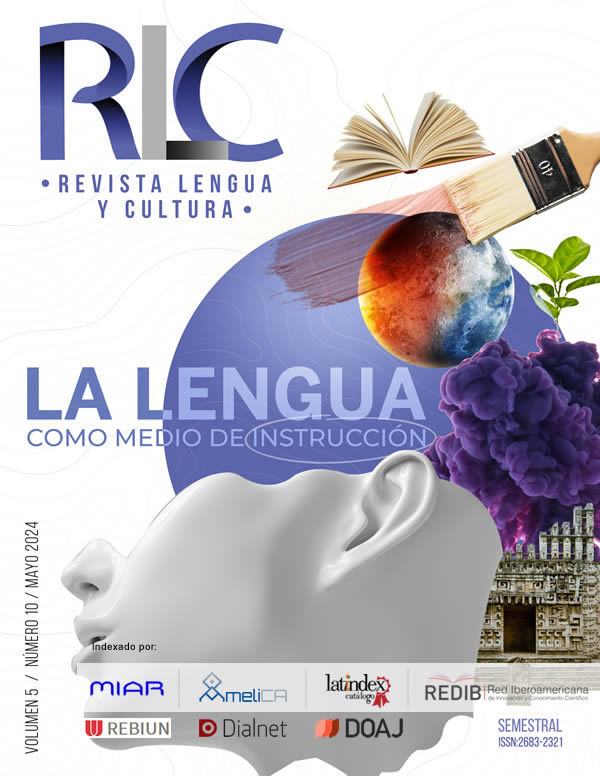El Impacto del Aprendizaje Informal del Inglés en Línea a Través de la Participación del Fandom
El Impacto del Aprendizaje Informal del Inglés en Línea a Través de la Participación del Fandom.
DOI:
https://doi.org/10.29057/lc.v5i10.12361Palabras clave:
Aprendizaje informal de inglés en línea (OILE), participación en fandom, lenguaje comunicativo, profesores de inglés pre-graduadosResumen
Esta investigación se propuso explorar el papel que tuvo la participación del fandom en línea en el proceso de aprendizaje de idiomas de estudiantes-profesores de pre-grado de inglés en México. Para lograr este fin, se recogieron datos a través de cinco entrevistas individuales con estudiantes, que previamente se habían identificado como participantes de un fandom en línea y consideraban haber desarrollado en gran medida sus habilidades en inglés como resultado de esta participación en el fandom. La evidencia indica que al involucrarse en comunidades de fans predominantemente de habla inglesa, los participantes adquirieron fluidez en la lengua meta, principalmente por sí mismos. Este aprendizaje tuvo lugar fuera del aula de idiomas en un ambiente atractivo y libre de estrés, independientemente de si los participantes eran conscientes de ello o no. Las implicaciones de este estudio sugieren que a medida que la tecnología y la educación avanzan, se deben buscar alternativas para incorporar herramientas extracurriculares alineadas con los intereses de los estudiantes y en beneficio de su proceso de aprendizaje de idiomas.
Descargas
Citas
Armstrong, J. K. (2022, February 24). How Sherlock Holmes changed the world. BBC Culture. https://www.bbc.com/culture/article/20160106-how-sherlock-holmes-changed-the-world
Bell, J., & Waters, S. (2018). Doing Your Research Project: A Guide for First-time Researchers. Open University Press.
Black, R. W. (2005). Access and Affiliation: The Literacy and Composition Practices of English-Language Learners in an Online Fanfiction Community. Journal of Adolescent &Amp; Adult Literacy, 49(2), 118–128. https://doi.org/10.1598/jaal.49.2.4
Black, R. W. (2006). Language, Culture, and Identity in Online Fanfiction. E-Learning and Digital Media, 3(2), 170–184. https://doi.org/10.2304/elea.2006.3.2.170
Black, R. W. (2008). Adolescents and Online Fan Fiction. Peter Lang.
Cohen, L., Manion, L., & Morrison, K. (2013). Research methods in education. Routledge.
Corbin, J., & Strauss, A. (2015). Basics of Qualitative Research. SAGE.
Creswell, J. W. (2014). Research Design: Qualitative, Quantitative, and Mixed Methods Approaches. SAGE Publications.
Godwin-Jones, R. (2018). Chasing the butterfly effect: Informal language learning online as a complex system. Language Learning & Technology, 22(2), 8–27. https://doi.org/10125/44643
Jenkins, H. (1992). Textual Poachers: Television Fans and Participatory Culture (Studies in Culture and Communication) (1st ed.). Routledge.
Nicholson, Jenny. (2020, July 21). The Last Bronycon: a fandom autopsy [Video]. YouTube. https://www.youtube.com/watch?v=4fVOF2PiHnc
Kubota, R. (2011). Learning a foreign language as leisure and consumption: enjoyment, desire, and the business of eikaiwa. International Journal of Bilingual Education and Bilingualism, 14(4), 473–488. https://doi.org/10.1080/13670050.2011.573069
Romano, A. (2016, June 7). Canon, fanon, shipping and more: a glossary of the tricky terminology that makes up fan culture. Vox. https://www.vox.com/2016/6/7/11858680/fandom-glossary-fanfiction-explained
Rutherford-Morrison, L. (2016, February 26). Where Did The Word “Fandom” Come From? Behind The Term That Changed The Internet Forever. Bustle. https://www.bustle.com/articles/144396-where-did-the-word-fandom-come-from-behind-the-term-that-changed-the-internet-forever
Saldaña, J. (2011). Fundamentals of Qualitative Research. OUP USA.
Sauro, S. (2017). Fandom and online interest groups. Language, Education and Technology, 131–142. https://doi.org/10.1007/978-3-319-02237-6_10
Sockett, G. (2014). The Online Informal Learning of English. New Language Learning and Teaching Environments (1st ed.). Palgrave Macmillan.
Sockett, G., & Kusyk, M. (2015). Online informal learning of English: frequency effects in the uptake of chunks of language from participation in web-based activities. Usage-Based Perspectives on Second Language Learning, 153–178. https://doi.org/10.1515/9783110378528-009
Stebbins, R. A. (2007). Serious leisure: A Perspective for Our Time. Transaction Publishers.
Tenuto, M. J., & Tenuto, J. (2014, October 14). Spockanalia -- The First Star Trek Fanzine. Star Trek. Retrieved November 13, 2022, from https://intl.startrek.com/article/spockanalia-the-first-star-trek-fanzine
The history of fandom. (2019, October 3). Distillery. https://www.wearedistillery.co/we-think/the-history-of-fandom
The Ring of Soshern - Fanlore. (n.d.). https://fanlore.org/wiki/The_Ring_of_Soshern



















